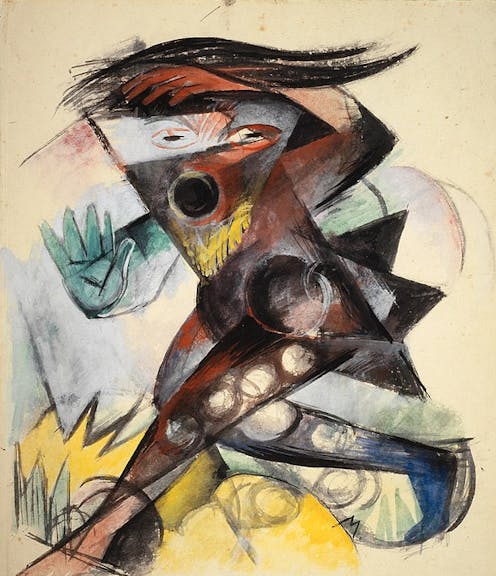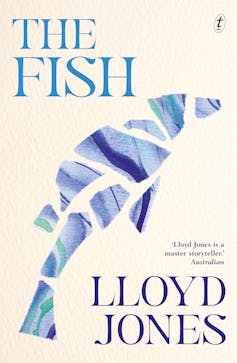
The unnamed narrator of Lloyd Jones’s The Fish is introduced to the word “correspondence” by his older sister Carla. Growing up in 1950s and 1960s Wellington, he discovers that “there is a world we wake to each day and there is the one we choose to describe”.
After years of such description, he comes to see how “I was reborn by my own writerly efforts, by this act of correspondence”.
Review: The Fish - Lloyd Jones (Text Publishing)

The line alerts the reader to the potential unreliability of his narration. It highlights how writers make choices about the ways they represent the world.
The narrator makes these choices in his letters (another kind of correspondence) to Carla, who, after becoming pregnant, is dispatched to Sydney. She, in turn, depicts her new life in glamorous terms.
Carla asks frequently after her younger sister, who is also pregnant, the father unknown. The sister, unnamed like the narrator, lives in a caravan near a golf course. When her child, Colin Montgomery – the “Fish” – is born, the narrator describes him as “a repulsive creature”. In trips to the caravan, their mother schools the family to respond with kind words and affection. The narrator comments:
It is a fish, yet we have to pretend it isn’t. We have to talk up its glossy hair. We must overlook its smell.
The Fish’s mother, combative and sweary, responds with anger to the hesitancy and discomfort her family display towards her child.
The growth of a writer
The Fish is a Künstlerroman: a story about an artist or writer’s growth to maturity.
To enable this growth, Jones’s narrator, like many a writer, cannibalises his family. The novel’s epigraph is from Nobel laureate Czesław Miłosz: “When a writer is born into a family, the family is finished.”
But what happens when that family has a visibly different member?
One the one hand, the Fish can be read as a metaphor for a novelist’s ideas. His strange appearance causes the narrator to wonder in the opening pages: “Who the hell is he? Where does he spring from?”
On the other hand, the Fish’s appearance, both literally and figuratively, is unspeakable. When Carla sends letters from Sydney describing her exciting life, entreating information about the Fish’s mother, the narrator does not know what to say about their new nephew. He decides that silence is best. As a result, “something is lost between us, a slippage between what is happening at home and what I choose to write about it”.
The “correspondence” that he formerly and happily created has been replaced by a lacuna. Disability, difference and illness are too unnerving for him to describe to his adored sister. He stops writing to Carla, and begins writing to himself.
Therein lies the novel’s ambiguous depiction of difference: it is the spur for creativity, but the narrator disparages its source. As a writer with a disability, this made me uneasy at times.
A family disintegrates
The Fish is left in the care of the narrator’s family as his mother becomes increasingly unwell from addiction. The narrator’s father, Colin Montgomery, after whom the Fish is named, drives around town to collect his daughter following her nights out. She moves between the house and the caravan, stormy and wild, until one day she disappears.
Without their wayward daughters, the family begins to disintegrate. A developer buys the campground, so the family acquires their daughter’s caravan and moves it into the back yard. They become silent, walking the shore of the sea “like pilgrims”, sometimes carrying the Fish as “bait” for his mother.
Six months after a trip to Disneyland to revive the sorrowful family, the narrator’s father, while swimming with the Fish, has a heart attack and dies. The narrator’s mother travels to Greece and revives, but only momentarily. On her return, she moves back into the caravan and becomes forgetful with dementia.

Eventually, the fabled Carla returns. Graceful and attentive (although with her own concealed history of working for an “agency” in Sydney), she takes the Fish on a holiday and he learns to ski. They return via ship, but it wrecks off Barrett’s Reef near Wellington, as the Wahine did in 1968. Carla makes it to shore, but the Fish, like his mother, disappears.
The narrative then breaks down into fragmented sentences, mirroring the narrator’s spiral into depression at the loss of the Fish.
Many years later, as the narrator edges to the end of middle-age, he finishes the story of “our Fish” in the caravan, now relocated to the country. He is
not sure what it is about. Is it about a freak or about concealment or shame?
The question of difference
It is puzzling that, in the narrator’s sense of his story’s possibilities, there is little scope for joy or hope. His attitude towards his nephew is by turns disparaging and compassionate.
He comes from a family that “cannot tolerate a misspelt word” and is exasperated when called in to help the Fish with his schoolwork. As the Fish grows into adolescence, the narrator describes his nephew’s hair as “an unsuccessful hair transplant”. The Fish’s gills are “vulgarly present” and his mouth “constantly gulps inside rubbery lips”. His eyes “take to bulging”, a habit the family finds embarrassing. When Carla reports that the Fish has had his first skiing lesson, the narrator scoffs: “The Fish wouldn’t know a ski from a chopstick.”
The narrator does not offer his nephew a gendered pronoun, referring to the Fish predominantly as “it”. He observes that when they looked at the Fish, “there was a transfer of interest where the Fish began to return the same curiosity to us”. Although he registers the Fish’s subjectivity in this way, he also forecloses it by writing: “In the end it had come down to who was first to get the story down.”
The family “defend Colin Montgomery’s fishiness” and love his paintings. Looking at them is like “diving into water. A feeling of fluid moving over you.” The Fish’s grandparents are devoted, praising his attempts at gymnastics. The narrator’s mother is particularly astute, not only in protecting the Fish, but also in recognising the narrator’s need to be alone (she lies for him when he does not want to see his girlfriend).
The narrator realises that his nephew “cannot stop being a fish any more than any of us can resist the person we grow into”. When icebergs crowd into the sea near Wellington in spring, the narrator describes the bergs, like the Fish, as “inviolably themselves, without any need of a photo to say they existed or language to describe them”.
And yet the narrator muses: “we wish Colin was not so wholeheartedly a fish – but a bit more like us”.
Freakishness and shame
While the narrator remains reserved towards his nephew, the community rallies around. When the narrator’s father dies, the Fish takes on his namesake’s job at the scrap yard, where customers “go out of their way to oblige the Fish”, helping him with his spelling and the accounts, and engaging him in conversation about their projects and parts.
These elements of the novel are touching, revealing a web of care that the narrator, who only wants to write, absents himself from.
Perhaps sensitised by his nephew, the narrator is drawn to other disabled people in his orbit. At the end of his street is a girl who “drags a club foot behind her”. With her “dark hair, dark eyes [and] rosy mouth”, he finds her
pretty in a standard sort of way. But dragging that foot behind pulls at her face, pulls her back into a disability.
He finds the amalgamation of beauty and disability “beautiful, a combination of loss and beauty”.
This description squarely asserts that disability is detrimental, illuminating the limits of the narrator’s compassion. He accuses the Fish of being unresponsive to his mother’s disappearance, yet at the same time he only begrudgingly offers his own love. He does not stop to think about how the Fish has contributed to his family life until it is too late. Even then, his grief at the loss of the Fish seems, given the novel’s construction, a grief at having lost the subject of his story, rather than the loss of his kin. His family is “finished”.
These moments highlight that, for the narrator, this is a story about freakishness or shame, rather than an illumination of what difference can bring to a family and community.
Many writers are selfish and would prefer to be left alone to work. But writers also have the capacity to open doorways to compassion and understanding. The Fish’s narrator only grudgingly accepts that his unusual family has facilitated his story. He creates a correspondence that represents difference as a deficit and, in doing so, reveals the limits of his literary power.
Jessica White does not work for, consult, own shares in or receive funding from any company or organisation that would benefit from this article, and has disclosed no relevant affiliations beyond their academic appointment.
This article was originally published on The Conversation. Read the original article.






